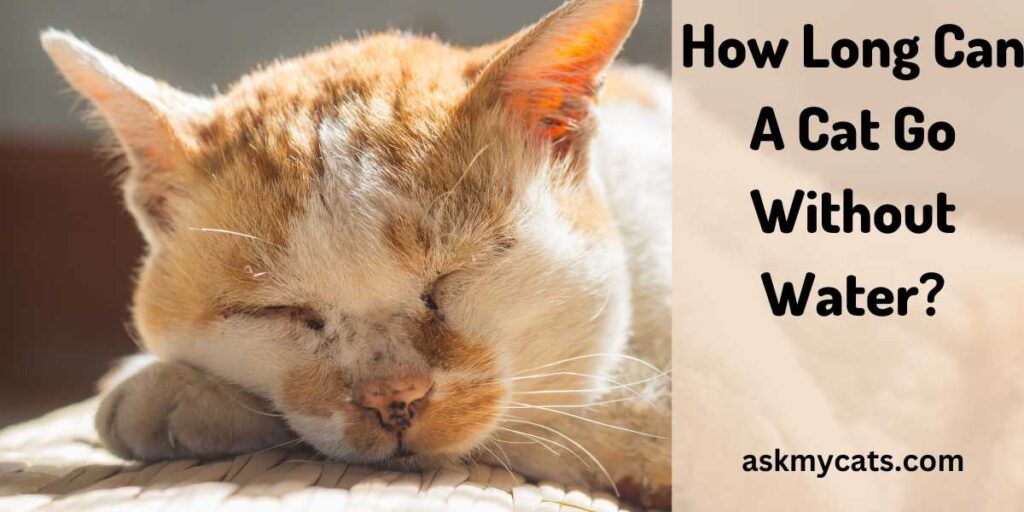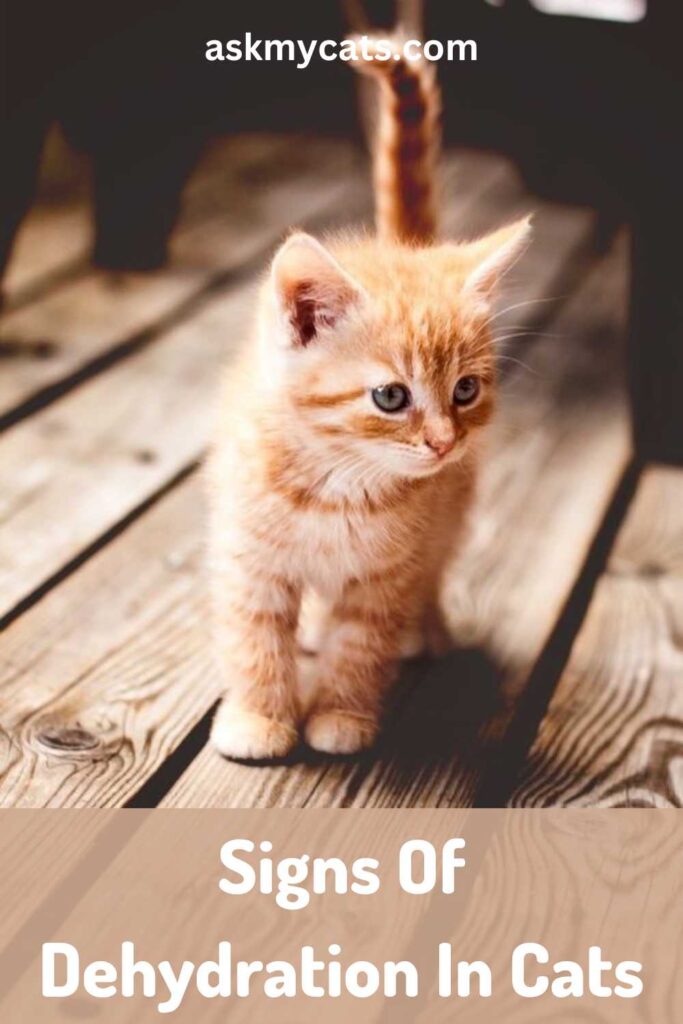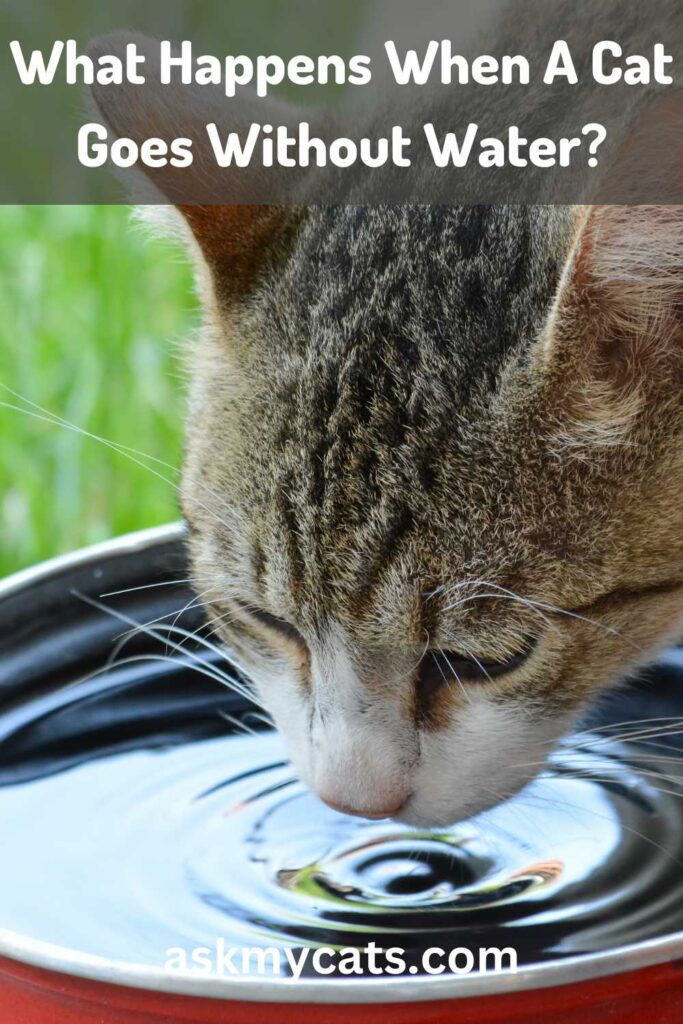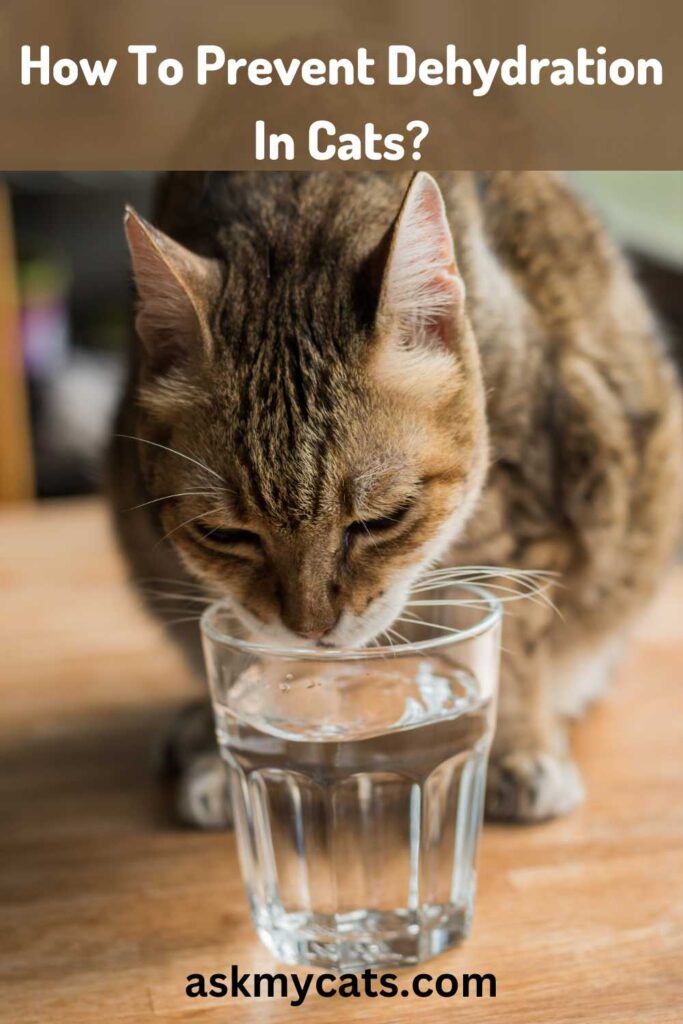Hey there, fellow cat lovers! As a proud owner of two feline furballs, I often wonder about their abilities to survive without certain necessities. One of those necessities is water.
As explained by Cornell’s College of Veterinary Care, “ Helping cats avoid becoming dehydrated is a very important aspect of their health maintenance, and being aware of how we can do this is a vital component of our being good stewards of their well-being.”
I mean, we all know how important it is for us humans to drink water regularly, but what about our beloved whisker buddies? Have you ever wondered, how long can a cat go without water?
Well, it turns out that the answer isn’t as straightforward as you might think. There are a few factors at play here, and the answer might surprise you.
So, let’s dive in and explore this topic together. Trust me; it’s fascinating stuff!
Key Takeaways
- Cats cannot go without water for more than 24 hours or 2-3 days at maximum.
- Although cats are good at regulating hydration levels, they need to consume a minimum of 40-60 milliliters per kilogram of body weight per day.
- Factors that affect a cat’s water needs include age, diet, health conditions, environment, and activity level.
- Signs of dehydration in cats include sunken eyes, lethargy, loss of appetite, and refusal to eat.


Give Your Cat the Perfect Day
Get the Free Ebook!
How Long Can A Cat Go Without Water?
Water is the wellspring of all life forces. Even though cats can survive approximately 2 weeks without eating food, they cannot go more than 24 hours ( or 2-3 days if we really push the limit) without having had water.
Water requirements of most cats fall more or less within the same bracket.
However, as per Tarina Anthony, DVM, owner and medical director of Aurora Cat Hospital and Hotel, there is a measurement formula that vets use.
“The normal water intake for a cat is highly individually variable, but ranges from 40–60 milliliters [approximately ¼ cup] per kilogram of body weight per day have been purported as ‘normal’—though 20–70 milliliters per kilogram per day might be normal,” she says.
To put it simply, if your cat weighs 5 kg (which is the average weight of a cat), she will need to consume 250 ml of water every day.
Anthony adds that your local vet can decide the ideal water requirement for your cat based on her routine calorie intake and compare it with the ideal body weight.
“The intake calculations are often used when increase or decrease in water intake is suspected, or in the hospital setting.”
Evolutionarily, cats are desert creatures, meaning that they are quite adept at maintaining and regulating their hydration levels, stringing water from the food they consume.
However, they cannot, in any case, survive more than 2-3 days without water. Beyond that point, dehydration would start kicking in, putting excessive stress on internal organs, and leading to organ failure.
Hence, you must ensure that your cat is drinking ample water all day long.
Interesting Read: Do Cats Need Food And Water At Night?
Factors Affecting How Long a Cat Can Go Without Water
| Factor | Effect on Cat’s Water Needs |
|---|---|
| Age | Kittens and seniors need more water |
| Diet | Wet food provides more hydration than dry food |
| Health | Certain health conditions may require more water intake |
| Environment | Hot, dry climates increase water needs |
| Activity Level | More active cats need more water |
Must Read: How Long Does It Take For A Cat To Die If It Stops Eating?
Signs Of Dehydration In Cats
Cats can go up to 2 weeks without food. Sustenance without water, however, is not possible for longer than 2-3 days.
“Water is essential for a cat’s body to work correctly. It keeps the cells going so all the organs work correctly,” Dr. Sievert, a vet at Stayyy says.
“It keeps the brain in good health, keeps blood circulating, improves metabolism, improves digestion and makes sure the cat doesn’t become constipated, removes toxins from the cat’s body through urine, and keeps their pH level in the appropriate range.”
Lack of water in the body leads to dehydration which, if not treated, can prove to be fatal and result in organ failure.

Dehydration can also be accompanied by loss of appetite and a refusal to eat. If a cat refuses to eat, it can trigger a condition called hepatic lipidosis, a liver infection that can very quickly prove to be fatal if not treated promptly.
“If your cat does not eat for three days, their body will use the excessive fat and break it down into energy for their body to use,” Dr. Ochoa, DVM, veterinary consultant at Dog Lab, explains. “This can cause a build-up of fat in your cat’s liver.”
This build-up of fat is essentially hepatic lipidosis or ‘fatty liver’. Overweight cats have greater quantities of stored fat, and thus, they have an increased risk of developing a fatty liver.
Must Read: How Long Can A Cat Go Without Eating?
According to PetMD, “With both weight loss and dehydration, the cat’s eyes will develop a sunken appearance. The eyes can also be a tell-tale sign of hepatic lipidosis as the sclera (white of the eye) develops a yellow, or jaundiced, appearance.
Cats that have been eating poorly and losing weight will also become depressed and weak.”
Lethargy and fatigue can lead cats to act in a way that is not in tandem with their regular behavior. They will appear to have sunken eyes, may feel out of breath, and might even collapse or faint due to weakness.
TEST 1: Check their Gums
One way to check whether your cat is dehydrated or not is by gently lifting her lips and stroking the inside of her gums gingerly. Ideally, they should be wet and slimy, however, if your cat is dehydrated, her gums will be dry and papery.
TEST 2: Skin pinch test
Gently pinch the skin over your cat’s shoulder blades and release it, the skin should quickly snap back into position. However, if it slows in settling back, then that could be a sign that your cat is dehydrated.
“This test only works in young, healthy animals with elastic skin and is not as useful once cats age or develop chronic illness,” warns PetMD.
Interesting Read: How Long Can a Cat Survive Locked in a Shed?
What Happens When A Cat Goes Without Water?
Dehydration in cats is a very grave illness and must be dealt with seriously. A cat’s water content influences its ability to carry out virtually all of the body’s vital processes and functions.
A shortage of fluids and electrolytes will lead to an impairment of all essential body organs, accumulation of waste material in the bloodstream, and inevitable organ failure.
“Within 24 hours of not drinking water, cats will become dehydrated,” Dr. Burch, a vat at Paramount Pet Health, explains.
“The longer a cat is not drinking water, the worse dehydration will become, electrolyte imbalances will occur, and organ damage.”

Severe dehydration also leads to increasing disorientation, confusion, hallucination, and alterations in heart rate and breathing.
Dehydrated cats are also susceptible to kidney failure and urinary tract problems, like urinal infections and tract blockage. Male cats are especially at risk for urinary blockages, which is a very painful medical condition.
“Dehydration can cause a number of health problems, including decreased circulation leading to multi-organ dysfunction, an inability to control body temperature, cardiac arrhythmias, and neurologic dysfunction, to name a few,” explains Cornell’s College of Veterinary Care.
Some are more prone to the adverse consequences of dehydration. These include senior cats, kittens, or cats with other underlying health conditions. The more fragile the immune system, the greater the risk for more severe side effects.
Proper hydration is the cornerstone of wellness and good health in cats. Dehydration is not a condition that can be taken lightly. It is a perilous medical condition and must be treated similarly.
If you suspect that your cat is dehydrated, then you must consult a vet immediately, without any delays.
Must Read: Why Does My Cat Not Drink Water?
How To Prevent Dehydration In Cats?

The most important step to prevent dehydration in cats by being observant and noting their behavior. Ensure that your fur baby is drinking water regularly and eating her food.
This observation of behavior will allow you to take quick action when things start going south.
Vets advise that cats should drink approximately 2 ounces of water per 5 pounds of their body weight.
Canned food has much more water content than dry foods, hence, it is preferred over the latter. If your cat intakes water content in the form of wet foods, then you won’t have to worry as much about how much water she is drinking.
Must Read: Are You Adding Water To Dry Cat Food?
However, if your cat is only eating dry foods, then she will have to drink more water separately.
Cats are notoriously picky eaters and fussy about their water sources. Ensure that you clean the food and water bowl regularly and that clean water is readily available to your cat. Some cats prefer drinking from the faucet, while others are inclined toward the fountain. Find out what your furry friend likes and ensure its availability.
At times, simple oral fluid consumption is not enough to treat dehydration.
Wag Walking says, “Intravenous administration of fluids directly into the vein is needed in most instances. The fluid levels should be brought up slowly and hospitalization is required for the process. The cat may need ongoing fluid replacement, and this is often done subcutaneously with a syringe through the skin on the back of the neck of the cat.”
You can try giving your cat electrolyte supplements purchased from vet stores to increase her hydration levels.
Interesting Read: Cat Looking At Water But Not Drinking? Know The Reasons Behind!
When Should You Seek Veterinary Care?
Ideally, as soon as suspect that your cat is dehydrated, you should approach the vet right away. Mere oral fluid consumption is not sufficient to get the hydration levels to normal. Professional care and expertise are necessary to treat dehydration properly.
Your vet will also be able to give an accurate diagnosis of the situation.
According to Pets.WebMD, “A quick procedure your veterinarian can perform involves them giving the cat fluids under the skin. In severe cases, your veterinarian can recommend hospitalizing your cat and giving them fluids through a needle that goes directly into the cat’s vein. This method can usually rehydrate your cat within a few hours or days.”
“Dehydration can be addressed in the veterinary clinical setting by either intravenous or subcutaneous fluid therapy, and restoring normal hydration is often a major treatment goal in cats that are diagnosed with a variety of diseases.”, says Cornell College of Veterinary Care
Hence, instead of treating your cat at home, it is important that you consult the vet at least once for their professional input and guidance.
Interesting Read: Do Cats Drink Less Water In The Winter?
Frequently Asked Questions
Are some cats prone to dehydration?
Yes, kittens, senior cats, and cats with prediagnosed medical conditions are more prone to dehydration and also more susceptible to its side effects and consequences.
“For instance, if your cat is experiencing cancer, diabetes, hyperthyroidism, or kidney disorder, it is helpful to talk with your veterinarian about how to maintain healthy and ideal hydration levels for your cat.”, advises Pets.WebMD.
Final Thoughts
Water is the cornucopia of all life forces. Each living organism requires sufficient quantities of water to carry out its essential bodily processes and in order to survive.
Cats are no different. Lack of proper hydration is extremely risky and can prove to be very hazardous to a cat’s life.
Cats cannot survive more than 2-3 days without water, and even that is a stretch.
Two of the most common signs of dehydration in cats are dry gyms and skin tenting. If you are suspecting that your cat is dehydrated, you must take her to the vet immediately for fluid administration. Severe cases might even need to be hospitalized.
Interesting Read: Why Won’t My Cat Drink Water From Her Bowl?
